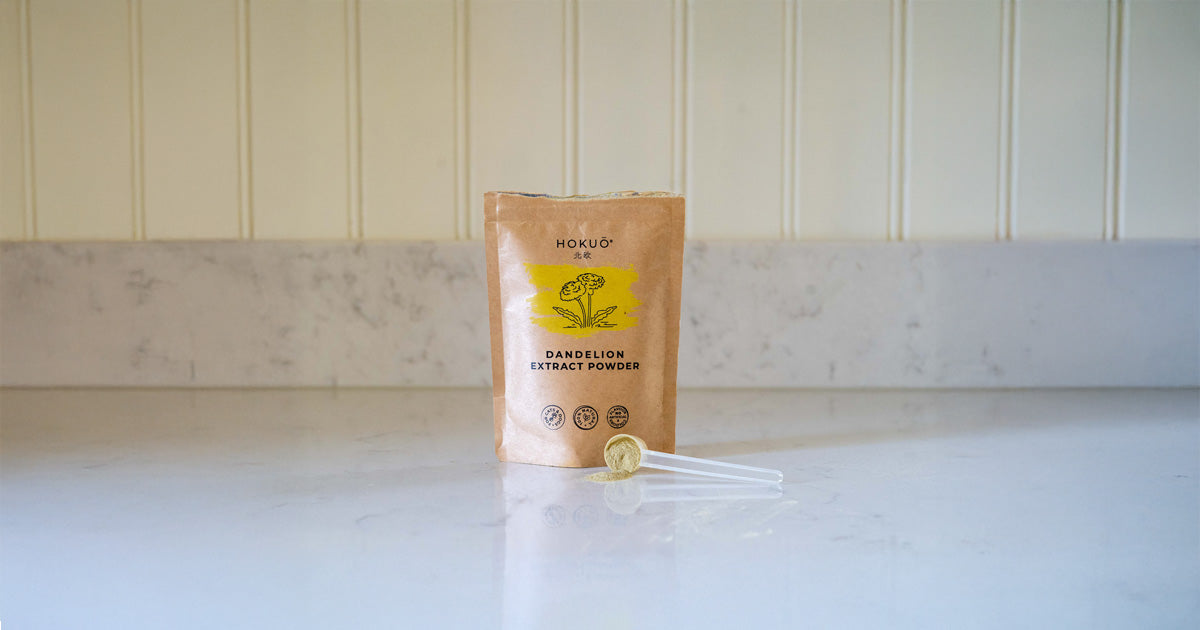
Mælkebøtte til hunde og katte: Hvad siger forskningen?
|
Tid til at læse 4 min
|
Tid til at læse 4 min
Om du kalder den mælkebøtte, løvetand, troldhekse eller Taraxacum officinale — så skal du i dag lære om en lille plante med store egenskaber.
Mælkebøtten bliver ofte betragtet som genstridigt ukrudt i haven, men i virkeligheden gemmer den på en lang række naturlige egenskaber, som moderne forskning i stigende grad sætter fokus på.
Som en person, der brænder for dyrevelfærd og naturlige løsninger, har jeg fået stor respekt for den ydmyge plante. Og med årene er det blevet tydeligt: mælkebøtten kan gøre en reel forskel for vores firbenede venner.
Både roden og blomsten fra mælkebøtten kan være med til at støtte lever, nyrer og fordøjelse på en skånsom og naturlig måde. Det bedste af det hele? Selv de mest kræsne kæledyr tager ofte godt imod det — og det er nemt at kombinere med fx bone broth eller andre fodertilskud.
Forskning har vist, at mælkebøtterod og -blomst påvirker flere biologiske systemer og hjælper kroppen med at opretholde balance og styrke indefra:
Leversupport – Mælkebøtte øger aktiviteten af antioxidanter som SOD og GSH, mindsker inflammation og fibrose og støtter kroppens naturlige afgiftningsveje.
Nyre- og urinvejssupport – Den let vanddrivende effekt hjælper med at skylle affaldsstoffer ud gennem urinvejene.
Fordøjelsessystemet – Mælkebøtte stimulerer galdeproduktionen, styrker tarmens bevægelighed og bidrager til en sund tarmflora.
Urinvejens sundhed og balance – Visse plantekomponenter i mælkebøtte, som fx taraxasterol, er i forskningslitteraturen blevet forbundet med en hæmmende effekt på uønsket krystaldannelse i urinen. Sammen med dens milde vanddrivende virkning peger det på, at mælkebøtte kan bidrage til et sundt urinvejssystem og hjælpe kroppen med at opretholde en naturlig balance. Selvom der stadig mangler direkte studier på hunde og katte, er det et område, der får stigende opmærksomhed i den videnskabelige verden.
Disse virkninger er dokumenteret i studier med dyr og cellemodeller og vækker stigende interesse for mælkebøttens rolle i kroppens generelle stofskiftebalance.
Der findes en række solide studier, som bakker op om brugen af mælkebøtte til både dyr og mennesker:
Leverbeskyttelse: Mælkebøtte har i dyrestudier vist evne til at reducere forhøjede leverenzymer og modvirke leverskader. (PubMed)
Antioxidanter: Flavonoider og polyfenoler i planten øger kroppens egne antioxidantenzymer som SOD og glutathion. (PMC)
Mod inflammation: I forsøgsmodeller har mælkebøtte mindsket betændelse og styrket kroppens modstandskraft. (PubMed)
Udrensning og væskebalance: Den let vanddrivende virkning fremmer udskillelse af affaldsstoffer via urinen. (BNRC)
Tarm og mave: Ved at støtte galdeproduktionen og tarmfloraen bidrager mælkebøtte til en mere balanceret fordøjelse.(PubMed)
Disse fordele viser sig især, når man anvender både rod og blad i kombination, og understreger mælkebøttens potentiale som naturlig, daglig støtte for hunde og katte.
Få 15 % rabat ved at klikke på knappen nedenfor.
Gælder kun mælkebøtteekstrakt. Kan ikke kombineres med andre rabatter eller tilbud. Tilgængelig så længe lager haves. Ingen rabatkode nødvendig – rabatten fratrækkes automatisk i kurven ved at klikke på ovenstående.
De fleste tilskud bruger kun enten rod eller blomst — men den ægte styrke ligger i samspillet mellem begge.
Når man kombinerer de to, får man en mere komplet og balanceret virkning: roden hjælper mave og lever, mens blomsten giver antioxidantbeskyttelse og støtter udskillelse. Sammen bidrager de til naturlig afgiftning — på en blid og skånsom måde.
En af de store fordele ved mælkebøttepulver er, hvor nemt det er at bruge — og hvor godt det typisk bliver taget imod, selv af kræsne kæledyr.
Her er tre enkle måder at bruge det på:
Mælkebøtte er alt andet end ukrudt, når det handler om dyresundhed. Det er en mild, men virkningsfuld støtte til leveren, nyrerne, tarmen og immunforsvaret — med dokumenteret effekt fra både forskning og erfaring.
Det er nemt at bruge, sikkert til daglig brug og velsmagende nok til, at selv kræsne kæledyr ofte tager godt imod det. En lille ændring i kosten – med stor effekt på sundhed og trivsel.
Ja — det kan sagtens bruges dagligt, især i perioder på 4–6 uger. Derefter kan du holde en kort pause.
Ja, mælkebøttepulver er velegnet til begge arter. Følg den anbefalede dosering og spørg din dyrlæge ved tvivl.
De naturlige bitterstoffer sætter gang i galdeproduktionen, hvilket hjælper leveren med at rense kroppen og opretholde en sund forbrænding.
De fleste tager fint imod mælkebøttepulver – især hvis det er blandet i bone broth eller i hjemmelavede snacks.
Protective Effects of Taraxacum officinale Root in Liver Failure — PubMed
Hepatoprotective effect of Taraxacum leaf extract (sodium dichromate model) — PubMed
The Role of Dandelion in Liver Health (narrative review) — PubMed
Purification and hepatoprotective polysaccharides from dandelion root — PMC
Antioxidant & hepatoprotection of leaf extract (APAP model) — PubMed
Hypolipidemic + antioxidative effects in rabbits (root + leaf) — PubMed
Medicinal properties review of Taraxacum officinale — PMC / BNRC




